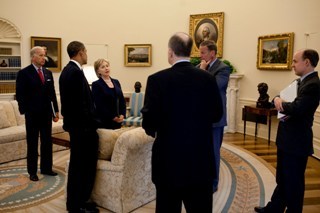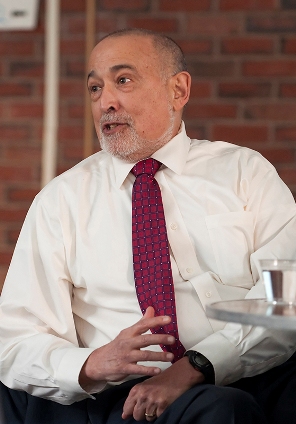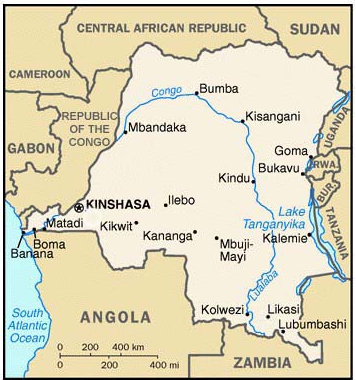
Image: Clinton Briefs Obama (State Department)
Now that secretary of State Hillary Clinton is officially "out of Africa," mainstream news reports from the Democratic Republic of Congo are practically non-existent. Spectacular stories of rape, violence and sensationalist stalking of the Secretary's comments have vanished from the news feeds. But life goes on in Congo, and there have been a series of events in recent days that bear scrutiny. Joseph Kabila has declared an "all clear" in the still-violent Kivu provinces, telling two million displaced to go home; the United Nations has released its analysis of the massacre at Kiwanja; and key fighters from the CNDP have deserted the "integrated army." In addition, Howard Wolpe, former director of the Africa Program at the Woodrow Wilson Institute and former Special envoy to the Great Lakes region under Bill Clinton, has once again resumed the post of special envoy at the request of Hillary Clinton.

Image: Howard Wolpe (Brandeis University)
Let's take a look at the Wolpe appointment. Wolpe, a former Michigan Congressman, previously served as an envoy to the region from 1996-2001 for President Clinton. More recently, he advised the Obama campaign on African issues and accompanied Clinton on her recent rip to Africa.
Wolpe knows the Great Lakes region intimately, and remarks given in testimony to the Senate Subcommittee on Africa in April 2009 offer a hint regarding what may evolve as American policy for the region. Wolpe said that America needs to rethink its approach to peace-building in Africa. "America's conventional approaches to peace building are deeply flawed because they seldom involve direct engagement with the key leaders of the belligerent parties, and virtually ignore the mistrust, suspicions and fears with which they enter the reconstruction process," Wolpe testified.
We spend considerable time focusing on structures and institutions, and establishing a multi-party electoral system. But the fundamental challenge of divided societies is not the absence of sufficient competitiveness. Rather, it is the absence of collaborative capacity: leaders that have been through years of conflict and war simply find it difficult to get beyond a "winner take all," zero-sum, mindset, to identify common interests, or to rebuild the trust and relationships required to enable them to work effectively together in rebuilding their societies. Yet, our governance and peace-building programs seldom have incorporated strategies or processes to build collaborative capacity. As a consequence, many peace-building initiatives are unsustainable, with countries returning to war within a few years.
Wolpe did not let foreign service diplomats off the hook in his testimony, saying that they often "were flying blind" in their inability to get a handle on what is happening outside of their own embassies, seldom engaging with local communities and village leaders.
Diplomats, as I have indicated, seldom know much about these techniques, but they do have access to national leaders, do understand the politics of divided societies, and comprehend the regional diplomatic environment. Trainers, on the other hand, though having the skills required to transform conflictual relationships, seldom have access to national leaders, generally have little background on the politics of these societies, and are generally not conversant with the diplomatic environment. In short, trainers and diplomats need each other if key leaders are to be drawn into the required training initiatives.
The State Department, despite repeated inquiries, has been all but mum about the Wolpe appointment. The African press has commented on it, and sources in DRC tell us that Wolpe is due to visit there within the next several weeks. There are only two special envoys on the African continent, and the other is General Scott Gration. His appointment to Sudan was announced with great fanfare by President Obama himself. A source with ties to Wolpe told us "the contrast is pretty startling." Why has Obama been silent on this? Could it be that the request came from Clinton and not Obama? Stay tuned.

Wolpe will have a lot on his diplomatic plate as he engages with Congolese President Joseph Kabila's announcement that it is time for the residents of the IDP camps to "go home." Various sources on the ground in eastern Congo tell us that while tensions have eased somewhat, the region is by no means secure and while some camp residents have decided to go home, there is concern that these individuals were handpicked and offered support by the government to serve as examples in a false "all clear."
Kabila spokesman Lambert Mende suggested that Kabila has budgeted for financial and logistical support for the returning displaced Congolese.
"Of course we are ready... the government has approved the move of the NGO'S (Non-Governmental Organizations) and the international agencies to close these camps because people are going back home and the numbers of those remaining were very, very low," Mende said in a statement reported by Africa News this weekend. Mende refuted reports that the displaced returnees were forced out of the camps, saying that they came by their own volition and are going home by their own will.
It is hard to imagine that it is possible for almost 2 million refugees to return home under government auspices, when an interview we conducted by telephone with one of Kabila's ministers recently revealed there was absolutely no money in his budget to offer basic help for rape victims.
In addition, sources say that even though Kabila has been threatening to shut down the IDP camps, UNHCR (UN High Commission on Refugees) has continued to insist that there is no forced return for refugees or IDPs, and that such action is against international law.
MONUC is reporting as of two days ago that tensions are still very high, especially in the area on the border between the provinces of North and South Kivu. "This remains a zone of tension due to the presence of armed groups in the area, notably the FDLR and non-integrated Mayi Mayi Kifuafua, that create a climate of permanent insecurity," MONUC says.
There you have it. "Permanent insecurity."
In fact, another report detailing attacks against humanitarian workers in this same region was released this weekend. Incidents against aid workers have increased 26 percent in the first six months of 2009, compared to the same period in 2008 in North Kivu. When looking at security incidents in Goma, a staggering 44 percent increase has been reported since January 2009 compared with the same period in 2008 says OSCHA, the United Nations Office for the coordination of Humanitarian affairs. Read the document here.
Timing is everything and Kabila's announcement about an "all clear" for returning IDP's came almost in tandem with long-awaited United Nations reports on what exactly happened at Kiwanja and other sites during October and November 2008 in north-eastern Kivu provinces. There were repeated clashes and intense fighting between Congolese government forces (FARDC) and the National Congress for the Defense of the People (CNDP), the latter led by Tutsi General Laurent Nkunda. Nkunda is now under house arrest in Rwanda and has been held for eight months with no formal charges. All UN and human rights reports indicate the violence escalated in timing with Nkunda's removal from the Kivus.
The UN mission in DRC (MONUC) released a report that implicates the Congolese army in 12 killings and 70 rapes. Human Rights Watch has been saying for months that the regular army is responsible for far more than these crimes, so the current UN report reads more like a whitewash of the true level of atrocities committed by the Congolese army.
The second report deals with the massacre at Kiwanja and finally puts the blame squarely on the head of General Bosco Ntaganda. "Bosco" was the commander with responsibility over the operations in Kiwanja, not only due to his overall position as CNDP Chief of Staff but also in his capacity as regional commander of CNDP in Rutshuru territory.
The military structure of CNDP was organized into several operational sectors. Until October 2008, the area of Rutshuru and Kiwanja was under the operational responsibility of Colonel Sultani Makenga whose base was in Bunagana. However, credible sources informed the UNJHRO that before the attack on Kiwanja there had been a shift between the respective areas of responsibility of commanders Bosco and Makenga resulting in the move of Makenga to Masisi territory and the deployment of Bosco Ntaganda to Rutshuru Territory. On 5 November, General Bosco Ntaganda was the commander with responsibility over the operations in Kiwanja, not only due to his overall position as CNDP Chief of Staff but also in his capacity as regional commander of CNDP in Rutshuru territory. His deputy for these operations was Lieutenant-Colonel Mulomba Bahati, and the officer reportedly directly in charge of the operation of Kiwanja, was Lieutenant-Colonel Innocent Zimulinda. Other CNDP officers identified by witnesses as participants in the operation and present in Kiwanja are Major Castro, Major Murenze, Major Kipanga,15 Major Mupenzi and Captain Seku.
Read the full reports here and here.
The report on Kiwanja expressed "deep concern" that "Bosco" had been absorbed into the Congolese army. Again, in some respect this is old news, as human rights organizations have been saying this for months.
In January of 2009, "Bosco" was involved in a coups d'état within the ranks of the CNDP that resulted in Commanding General Laurent Nkunda's detention by Rwandan authorities. Nkunda has consistently denied personal involvement in the Kiwanja massacre, and told the Huffington Post as much in January .
Q. Can you tell the world what happened at Kiwanja?
N. Kiwanja was liberated by the CNDP on the 28th of October, [2008]. We were in Kiwanja for one week without any killing, any rape, any looting. One week later the government [FARDC], along with Mai Mai, attacked Kiwanja and they occupied Kiwanja for 24 hours. My forces went back [withdrew] from Kiwanja. And in 24 hours, 74 people were killed.
And before we came back to Kiwanja the governor of Goma, in the morning, announced that in Kiwanja there were massacres. When I heard on the radio that there were massacres in Kiwanja, I called my guys [soldiers] on the ground and said, "Where are you?" They said, "We are in Rutshuru." I said, "Who is doing this?" They said they did not know, that they were in Rutshuru.
So we went back to Kiwanja on the afternoon of the 29th, or the 27th. [Nkunda leans over to check dates with an adviser.] We went back 24 hours later and some people were killed in the crossfire. To that we can testify. Because the Mai Mai, they do not know how to shoot; they shoot where they want and when they were retreating they were shooting.
And we saw that even the Hutu community in Rutshuru wrote a letter about that and they gave it to [unclear] and said they were not killed by CNDP.
In another interesting development Voice of America reported:
Hundreds of former rebels have deserted the Congolese army in the eastern Democratic Republic of Congo, citing complaints about pay and their assigned military ranks. The U.N. mission in Congo says discussions with the breakaway group are ongoing.
The group's renegade battalion, led by a former rebel militia officer known as Jaguar, deserted the Congolese army late Friday in the eastern province of North Kivu, though the rebellion was not reported until Tuesday.
The former rebels then attacked a local village 10 kilometers away, injuring civilians and stealing goods.
However, sources within the CNDP tell us that the VOA report is inaccurate, especially regarding the colorfully-named commander, "Jaguar."
Lt. Col. Jaguar has never created any scission (sic), any looting nor movement of his forces. It is the government {Congolese} which mobilized its forces mixed with Jaguar's to leave him when he was asking them about salary and promotion issues, after asking him to rotate command and hand it over to a promoted Major from FARDC. The Congolese government is looking at how to dismantle CNDP forces by putting them in bad situations and conditions by using Bosco Ntaganda. That is why Jaguar refused. He wanted to show the International Community and the government that Bosco has no control over CNDP forces.
So, although there is still much needed reportage on the political situation in DRC, without spectacular headlines, media in the United States has unfortunately gone silent.
There is a very good interview with Howard Wolpe archived with NPR and David Inge . You may access it here.